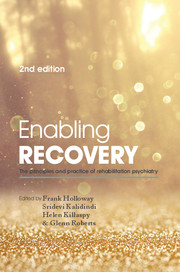Book contents
- Frontmatter
- Contents
- List of contributors
- List of figures, tables and boxes
- Preface
- Part 1 Setting the scene
- Part 2 Treatment approaches
- Part 3 Key elements of a rehabilitation service
- Part 4 Special topics in psychiatric rehabilitation
- 23 Special topics in psychiatric rehabilitation: overview
- 24 Rehabilitation and acquired brain injury
- 25 Autism spectrum disorder
- 26 Risk management in rehabilitation practice
- 27 Rehabilitation: an international perspective
- 28 Psychosocial rehabilitation across culture: the experience in low- and middle-income countries
- 29 Expanding the evidence base
- Part 5 Future directions
- Index
25 - Autism spectrum disorder
from Part 4 - Special topics in psychiatric rehabilitation
Published online by Cambridge University Press: 02 January 2018
- Frontmatter
- Contents
- List of contributors
- List of figures, tables and boxes
- Preface
- Part 1 Setting the scene
- Part 2 Treatment approaches
- Part 3 Key elements of a rehabilitation service
- Part 4 Special topics in psychiatric rehabilitation
- 23 Special topics in psychiatric rehabilitation: overview
- 24 Rehabilitation and acquired brain injury
- 25 Autism spectrum disorder
- 26 Risk management in rehabilitation practice
- 27 Rehabilitation: an international perspective
- 28 Psychosocial rehabilitation across culture: the experience in low- and middle-income countries
- 29 Expanding the evidence base
- Part 5 Future directions
- Index
Summary
Introduction
The autism spectrum disorders comprise a set of neurodevelopmental disorders characterised by a ‘diagnostic triad’ of impairments that manifest in early life and continue into adulthood:
• qualitative abnormalities in communication
• qualitative abnormalities in reciprocal social interaction
• a restricted and repetitive repertoire of interests and activities.
Many more or less synonymous terms are used to describe membership of the autism spectrum; this is a product of both medical legacy and of the sociopolitical agenda of people with autism and their supporters. Such terms include autism spectrum disorder, pervasive developmental disorder and autism spectrum condition. To avoid the negative connotations of the word ‘disorder’, this chapter refers to ‘autism’ unless a specific diagnosis within the spectrum is considered. People with autism will often emphasise the notion of ‘difference’ as opposed to ‘disorder’ by contrasting their way of being to that of people without autism, whom they may refer to as ‘neurotypical’.
Approximately 1% of adults meet diagnostic criteria for autism of one form or another, and approximately half of these also have an intellectual disability. While some people with autism are highly dependent, many others live independently but at significant social disadvantage (Brugha et al, 2011). Recognition that people with autism include an invisible minority with significant unmet health and social needs has led to an increasing amount of clinical guidance and legislative attention over recent years. The National Institute for Health and Care Excellence (NICE, 2011, 2012) has published guidelines on autism in children and young people and on autism in adults. The Autism Act 2009 was the first disability-specific legislation to be passed in the UK and resulted in a national strategy for adults with autism in England and Wales, ‘Fulfilling and Rewarding Lives’. This sets out recommendations for central government, local authorities, health services and other social agencies.
This chapter presents the clinical features of autism, describes its assessment and treatment, and considers recovery in autism.
- Type
- Chapter
- Information
- Enabling Recovery , pp. 374 - 390Publisher: Royal College of PsychiatristsPrint publication year: 2015



